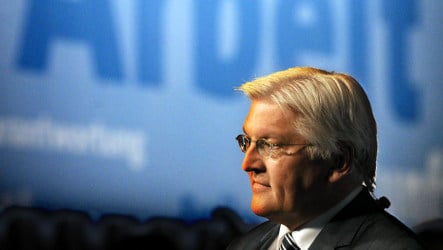Foreign Minister Frank-Walter Steinmeier is carrying the centre-left Social Democrats’ (SPD) banner into the September 27 election and was formally launching his campaign with a plan to create four million jobs by 2020.
With the economy shaping up to be the campaign’s decisive issue, Steinmeier said his platform would turn the tide in favour of his party, which is trailing Merkel’s conservatives by as many as 15 points in the polls.
“If we want to find a way out of the crisis, we need to have our eyes on the prize and a compass that leads there,” said Steinmeier.”That is why we need ambitious long-term goals and visionary policy.”
Unemployment data released last week revealed that approximately 3.5 million people were out of work in Europe’s biggest economy, with economists saying the figure could hit 4.5 million by the middle of next year.
The 67-page “Plan for Germany” says energy-saving and “green” industries such as building electric cars could employ two million Germans and transform the country into the “Silicon Valley of ecological industrial production.”
Steinmeier sees another million new jobs in health and geriatric care as Germany’s population ages, with the remaining million jobs in “creative” industries such as film and television, as well as services and trade.
The candidate, who is also Germany’s vice chancellor, has struggled to score points against the popular Merkel, who has honed an image as an effective if cautious crisis manager. She aims to dump the SPD as junior partner to her conservative Christian Union bloc (CDU/CSU) and link up with the smaller pro-business Free Democrats (FDP) in a centre-right coalition after the election.
The influential Der Spiegel newsweekly, which obtained an advance copy of Steinmeier’s manifesto, said the SPD had abandoned its hopes for victory, seeing its best chance in a return to the left-right grand coalition.
“The SPD’s strategy is now being reduced to the singular aim of preventing a CDU/CSU-FDP government,” it said. “Steinmeier and (SPD chief Franz) Müntefering want to salvage government participation in a grand coalition, and they both know that if this fails, their days at the top of the party will be numbered.”
Conservative Economy Minister Karl-Theodor zu Guttenberg accused Steinmeier of making pie-in-the-sky promises with no plan for how they would be financed.
“People are sick of being bombarded with pledges during election campaigns,” Guttenberg said. “They are right to expect specific proposals. There are very few of those in the SPD plan.”
Several newspapers said Steinmeier had sacrificed credibility with his four-million-jobs pledge.
“Steinmeier is not making it hard for his opponents. Of course they’ll have to ask him why the SPD hasn’t performed the labour miracle during its last 11 years in government,” the daily Hamburger Abendblatt wrote.
The centre-left Süddeutsche Zeitung said the manifesto was “imaginative, has substance and a good foundation” but that the four-million figure was “wishful thinking”.
Political scientist Peter Lösche told the daily Der Tagesspiegel that the platform was a “desperate attempt by the Social Democrats to gain ground in economic policy because the CDU has much higher ratings in that area – a real problem for the SPD because that issue will decide the election.”



 Please whitelist us to continue reading.
Please whitelist us to continue reading.
Member comments